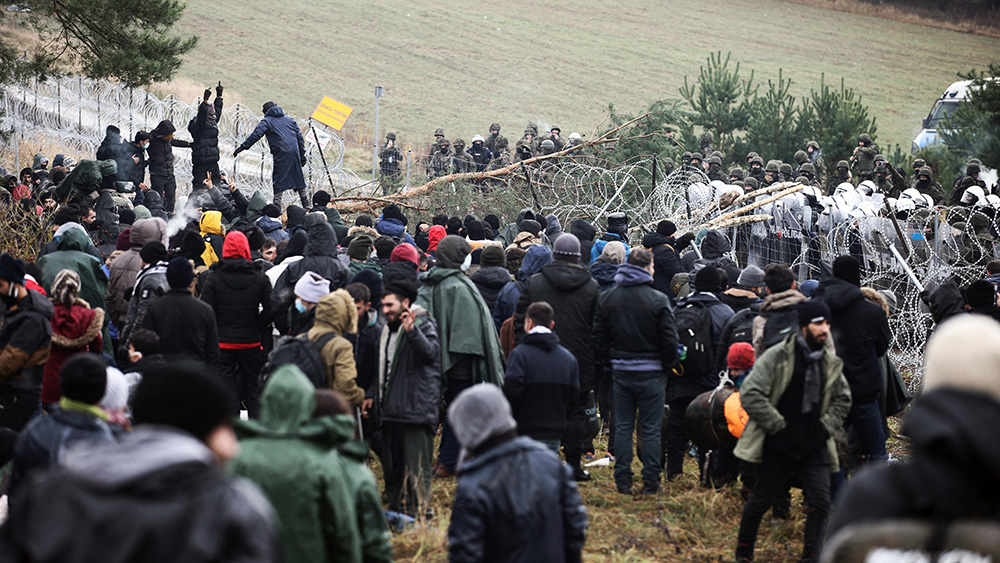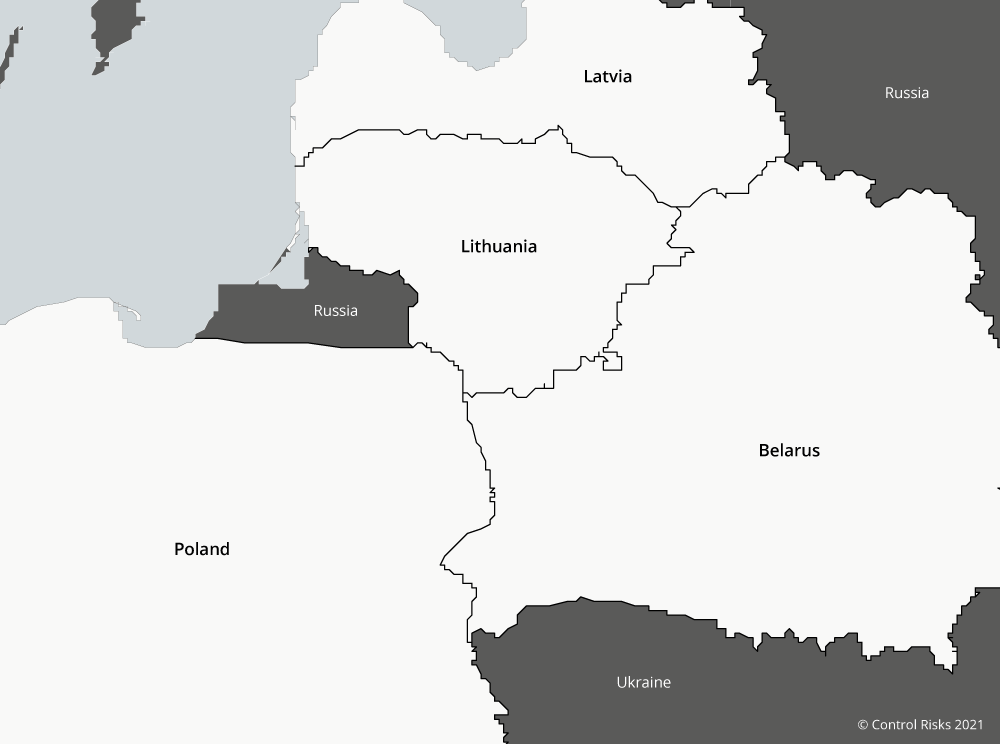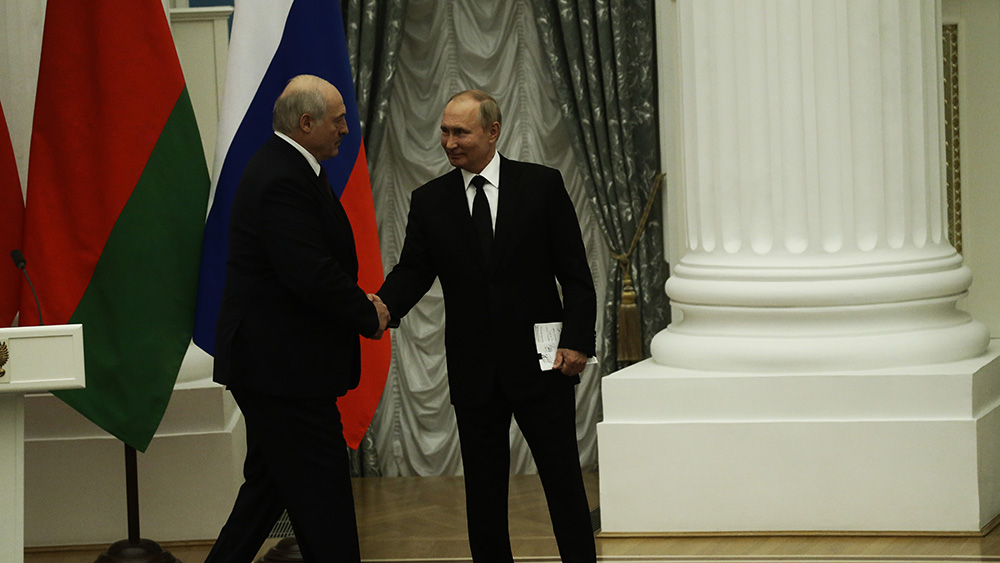Tensions at the Belarus-Poland border have been simmering in recent weeks, where thousands of people seeking to migrate to the EU from the Middle East and elsewhere are stranded between the two countries in hopes of crossing into the EU. We look at the origins of the crisis and its likely trajectory in the coming months.
- The border crisis ultimately constitutes a confrontation between the Belarus-Russia alliance on one hand, and the EU on the other.
- Russia will continue backing Belarus’s denial of a role in the crisis, as well as supporting controversial Belarusian President Alexander Lukashenko.
- Belarus’s orchestration of the border crisis is unlikely to end in the coming months despite the looming prospect of new EU sanctions targeting state officials, entities and companies implicated in the crisis.
- The crisis, along with the fundamental political instability and unpredictability of Lukashenko’s government, will continue to have repercussions for the EU, and will drive reputational risks for foreign companies.
Simmering tensions
Belarus and its longstanding president Lukashenko, often referred to by his critics as “Europe’s last dictator”, is under the international spotlight once again. Between August and November 2020, attention was focused on his government’s use of mass arrests and intimidation against those demanding that Lukashenko resign in the aftermath of presidential elections that were neither free nor fair. Fast forward to November 2021, and his government’s manufacturing of a crisis on the EU’s borders is grabbing more international headlines. The EU has accused Belarus of waging a hybrid war on the bloc and “weaponising” refugees and migrants for the sake of punishing the EU for criticising Lukashenko and imposing sanctions on his government. Video footage released by the Polish authorities on 8 November showed thousands of migrating people on the Belarusian side of the border, and both sides have occasionally fired warning shots in recent days as the people attempt to cross into Poland. Poland has stationed at least 17,000 soldiers, border guards and police officers in the area and a razor wire fence has been erected along the border.

Hundreds gather near Poland’s border in Belarus’s Grodno region, 8 November 2021 (Photo credit: Leonid Shcheglov/BELTA/AFP via Getty Images)
Belarus has called these assertions “absurd” and warned Poland against any “acts of provocation” directed at Belarus. As the EU inches closer to imposing new sanctions on Belarus in response to the crisis, Lukashenko on 11 November threatened to suspend Russian gas flows to Europe going through Belarus and refused to help resolve the crisis unless the EU lifts existing sanctions.
Humanitarian crisis
Latvia, Lithuania and Poland since June have reported a surge in the number of people attempting to cross their borders from Belarus. One after another, the recipient countries have reinforced borders and imposed states of emergency in their regions bordering Belarus.

Most refugees and migrants are concentrated near the border with Poland as many are looking to eventually cross into Germany to seek asylum status. Thousands are stuck between Belarus and Poland, as neither side allows these people to enter or re-enter their country despite sub-freezing conditions, and they face cross-border pushbacks by border officers. Rights groups and the UN have criticised these pushbacks and the poor conditions that have led to the deaths of at least ten migrating people.
Belarusian revenge
Belarus’s relations with the EU have been progressively worsening since August 2020, while Lukashenko’s erratic behaviour – best exemplified by his government’s forced diversion of an intra-EU flight in May to arrest an exiled dissident who was on board – suggests that his government is prepared to accept the status of an international pariah.
Lukashenko is highly likely to continue encouraging migration to the EU for as long as he can to punish the bloc and divide it over one of the most contentious issue – migration. Belarus is especially keen to penalise Poland, which in August granted political asylum to Belarusian Olympic athlete Kristina Timanovskaya who had defected from the Belarusian team.
How it started
The crisis began in June, when Lukashenko in response to the fourth round of EU sanctions announced that his government would no longer protect the borders with EU neighbours. The open-border policy is what drove the first wave of people from Iraq, Somalia, Afghanistan, Yemen and Congo to cross into Lithuania via Belarus in July. Since then, credible reports, including by the authorities in Latvia, Lithuania and Poland, have suggested that Belarusian authorities are directly involved in diverting refugees and migrants to EU borders. The Latvian authorities in August shared video footage showing Belarusian militarised units diverting these people to the Latvian border, while Lithuanian border officials in November said that Belarusian authorities are “possibly transporting” these groups to the Lithuanian border. In the meantime, credible media reports suggest that travel agencies linked to the Belarusian government collect fees from migrants for organising their travel and a short stay in Belarus, and ultimately a transfer to the EU border where migrants attempt to cross into the EU.
The number of flights from the Middle East to the Belarusian capital Minsk has been increasing in recent weeks, according to EU officials. The EU’s attempts to suspend these flights by using diplomatic pressure are likely to be only a temporary solution as airlines are unlikely to suspend flights or restrict one-way ticket sales from the Middle East to Minsk for a long period.
More than EU-Belarus tensions
The border crisis ultimately constitutes a confrontation between the Belarus-Russia alliance on one hand, and the EU on the other. Russia’s economic and political support has enabled Lukashenko to withstand domestic protests and increasing isolation from the rest of the world under the weight of Western sanctions targeting several Belarusian sectors. Russia has not only backed Lukashenko’s denial of any direct involvement in the border crisis but has capitalised on it by criticising the EU’s response to the humanitarian crisis as poor and hypocritical.
At the same time, Belarus’s membership in the Russia-led Collective Security Treaty Organization (CSTO) – an intergovernmental military alliance that includes Armenia, Kazakhstan, Kyrgyzstan and Tajikistan – has increased the threat of putting Russia at odds with NATO over the crisis. NATO on 4 November said it was “closely monitoring” developments at the border. However, a direct conflict between Russia and NATO is unlikely as both sides understand the costs of such an escalation.
As such, Russia is likely to continue backing Lukashenko’s narrative of the crisis, insofar as it does not pose a credible threat of sectoral sanctions on the Russian economy – an unlikely prospect. Another element of Russia’s continued support for Lukashenko will rest on Lukashenko’s ability to keep large protests at bay and to keep Belarus firmly aligned with Russia. Russia on 15 November offered to help resolve the crisis as a mediator but said that the West itself caused the crisis by fighting protracted wars in the Middle East.

Putin and Lukashenko at a press conference in Moscow, September 2021 (Photo credit: Mikhail Svetlov/Getty Images)
Sanctions, reputational threats
The prospect of new sanctions is unlikely to deter Belarus from disengaging from the crisis. The EU, US, UK, Canada and other Western countries are increasingly likely to expand their sanctions against Belarus in response. EU officials on 15 November endorsed a fifth package of sanctions that will target “everyone involved in this illegal push of migrants”. These sanctions will be finalised in the coming weeks and are likely to target individuals and entities close to the Belarusian government that are perceived to be involved directly or indirectly in facilitating migration, including travel agencies, airlines and airports. Targets will likely include sectors and entities that EU member states could more easily agree on with minimal impact on EU trade.
A significant expansion of EU sectoral sanctions on balance is unlikely – though possible, considering Lukashenko’s growing willingness to test red lines in punishing the EU. EU member states are unlikely to agree on major sectoral sanctions in current circumstances. That said, a significant expansion of the crisis that has a direct impact on EU companies or citizens will increase the threat of new sectoral measures, and foreign investors doing business in Belarus will face increasing reputational risks.
Despite his threats, Lukashenko is unlikely to cut off Russian gas flows to the EU because Russia opposes such a move and Lukashenko is not in a position to defy Belarus’s main ally. Lukashenko’s staunch reserve to perpetuate the migration crisis along with the EU’s refusal to capitulate to Belarus’s blackmail using migrants is likely to continue, and the crisis is unlikely to be resolved in the coming months.
